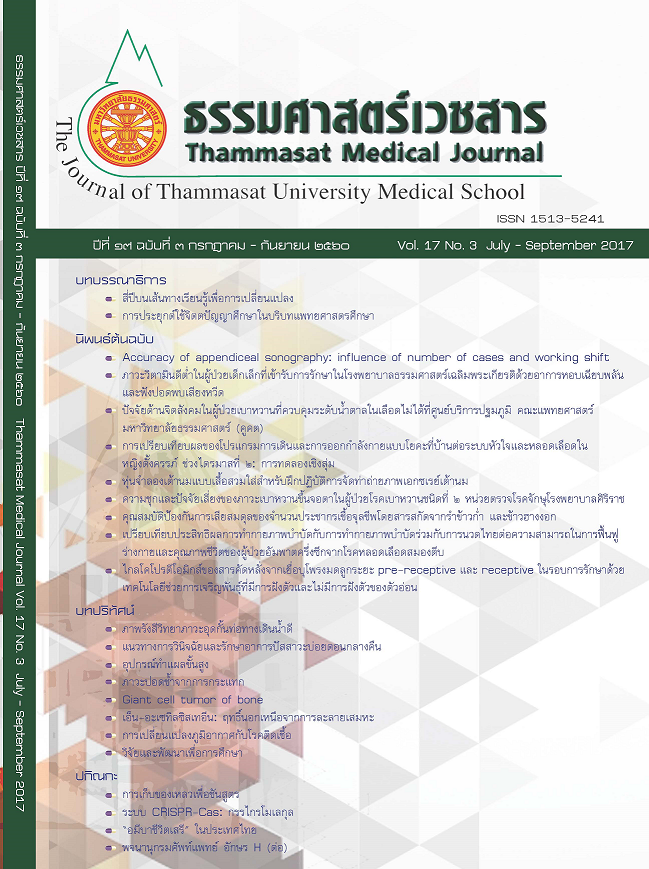Diagnosis and management of nocturia
Keywords:
Nocturia, Cause, Pathophysiology, Diagnosis, Treatment, ปัสสาวะมากในเวลากลางคืน, สาเหตุ, พยาธิสรีรวิทยา, การวินิจฉัย, การรักษาAbstract
Nocturia affects people of different ages, races, and genders all over the world. The prevalence of nocturia in both men and women increases with age. Nocturia mostly affects the quality of life than other lower urinary tract symptom because nocturia impairs sleep efficiency and is associated with increased morbidity and mortality. Nocturia may be divided into the following 4 causative categories: reduce bladder capacity, global polyuria, nocturnal polyuria, and sleep disorder. For the clinical assessment, a voiding diary is the single most useful tool in evaluating and classifying the cause of nocturia and a thorough evaluation of nocturia should include a complete history, physical examination, and investigation. Life style advice is often given as a first-line option. These measures include fluid restrictions both restrict volume and avoidance of caffeinated beverages and alcohol. Treating nocturia should focus on the causative categories. Nocturia occurs more often as a consequence of process unrelated to lower urinary tract dysfunction. Health care professionals need to consider all medical aspect to isolated the causes of nocturia for the diagnosis and optimal treatments to improve the quality of life of the patients.
แนวทางการวินิจฉัยและรักษาอาการปัสสาวะบ่อยตอนกลางคืน
อาการปัสสาวะมากตอนกลางคืน หรืออาการปัสสาวะบ่อยตอนกลางคืน (nocturia) สามารถพบได้ในคนทุกเพศ ทุกวัย ทุกเชื้อชาติ โดยพบเป็นสัดส่วนที่มากขึ้นตามอายุที่เพิ่มขึ้น ปัจจุบันพบว่า nocturia เป็นปัญหาที่รบกวนคุณภาพชีวิตมากที่สุดของกลุ่มอาการระบบทางเดินปัสสาวะส่วนล่าง (lower urinary tract symptoms) และสามารถก่อให้เกิดปัญหาตามมาได้หลายอย่าง เช่น
การนอนหลับไม่เพียงพอ ส่งผลให้เกิดการอ่อนเพลียและอุบัติเหตุตามมาได้ และยังส่งผลเกี่ยวกับระบบหัวใจและหลอดเลือด (cardiovascular), ภาวะซึมเศร้า (depression), ระบบต่อมไร้ท่อ (endocrine), ระบบภูมิคุ้มกันของร่างกาย (immune), ความผิดปรกติของการเผาผลาญ (metabolic disorder) อีกด้วย สาเหตุของ nocturia สามารถแบ่งได้เป็น ๔ อย่าง ได้แก่ ความจุของปริมาตรกระเพาะปัสสาวะลดลง (reduce bladder capacity), ร่างกายผลิตปัสสาวะออกมาปริมาณมาก (global polyuria), การผลิตปัสสาวะออกมาในช่วงเวลากลางคืนมาก (nocturnal polyuria) และปัญหาจากการนอนหลับ (sleep disorder) วิธีการวินิจฉัยที่ดีที่สุดคือ การให้ผู้ป่วยจดบันทึกการปัสสาวะ ร่วมกับการซักประวัติและตรวจร่างกายอย่างละเอียด และส่งตรวจเพิ่มเติมทางห้องปฏิบัติการตามข้อบ่งชี้ เพื่อการวินิจฉัยสาเหตุของภาวะ nocturia การรักษาผู้ป่วย nocturia ทุกรายควรเริ่มต้นด้วยการปรับพฤติกรรมเกี่ยวกับการทานน้ำและเครื่องดื่ม และให้การรักษาที่จำเพาะตามสาเหตุของ nocturia ในผู้ป่วยรายนั้นๆ เช่น พิจารณาให้ยาปิดกั้นแอลฟ่า (1-blocker) ในรายที่มีอาการต่อมลูกหมากโตร่วมด้วย, ยาเดสโมเพรสซิน (desmopressin) ในรายที่มีภาวะ nocturnal polyuria เนื่องจากสาเหตุของภาวะ nocturia ส่วนใหญ่มักเกิดจากสาเหตุอื่นที่ไม่ใช่ความผิดปรกติของระบบปัสสาวะ แพทย์ผู้ทำการตรวจรักษาจึงต้องให้การวินิจฉัยสาเหตุของ nocturia อย่างถูกต้องว่าเป็นจากสาเหตุใด เพื่อแพทย์สามารถให้การรักษาได้อย่างถูกต้องเหมาะสมผู้ป่วยก็จะมีคุณภาพชีวิตที่ดีขึ้น และลดปัจจัยเสี่ยงต่อปัญหาต่างๆ ดังกล่าวข้างต้น



